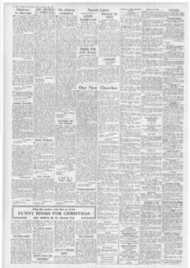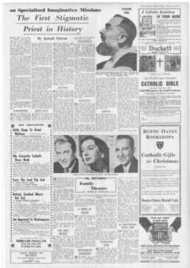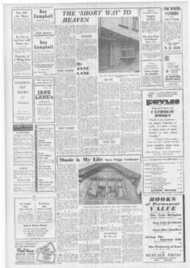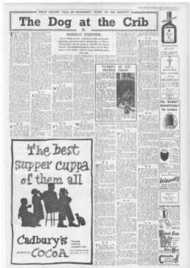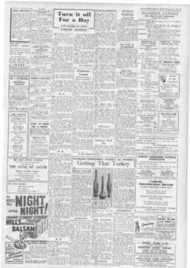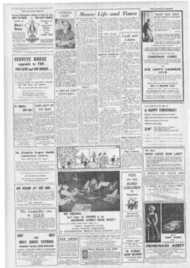Page 8, 6th December 1957
Page 8

Report an error
Noticed an error on this page?If you've noticed an error in this article please click here to report it.
Tags
Share
Related articles
"putting First Things First . . .
'freedom From Hunger'
Catholic Women Of The Year
No Easy Answers
How The Other Half Lives O Ut Of Every Thousand Babies
He roused a Nation to Care I01' the Homeless
By Rosemary Haughton
TN every 1,000 children born, between 20 and 230 die in the first year of life, according to whether the country in which they are born is fullyor underdeveloped.
In Denmark a man's average expectation of life is 69 years, in India it is 32.
At least half the population of the world has less than the necessary minimum of calories; another 25 per cent. live on a diet that makes it impossible for them to live a fully active life. There are 150,000.000 families without homes, living in shantytowns. tents, or caves.
The ratio of standards of living in under-developed countries to that in fully-developed countries is 1 : 40, This difference is increasing.
A Challenge
WHE blunt facts are a challenge to the Christian conscience.
" The moment has come when those who claim to be Christians must awake to the fact that, in God's eyes, blasphemy does not Lie in the angry cry which rises to a man's lips when he sees his chi'dren suffering. It lies in the indifference in the hearts of thosc who claim to be Christians to the profanation of the image of God which is happening in thousands of millions of human beings throughout the world."
These are the words of the Abbe Pierre, and he, of all men, has the right to issue such a challenge.
This Man THIS is the man who spent the Jo. occupation period rescuing hunted people from the Nazis and organising resistance groups.
He was himself twice captured by the Gestapo and twice escaped. This is the man who, after the war, foun ded "Emmaus", a dilapidated mansion outside Paris where all sorts of social outcasts came to live, because the Abbe respected them, gave them work to do, and asked no questions.
This is the man who began building houses for the wretched families who sheltered in garrets and cellars and tents because they could not afford the inflated rents of flats and hotel rooms. The men from Emmaus built little houses for these people more unfortunate than themse'ves in the face of unscrupulous opposition from officials and interested persons.
When money for the building ran out the Abbe begged in the streets, and later he and his men
took to rag-picking and raking over the garbage dumps for
bottles and bones to sell to deaTers. so that a few more people could be housed like human beings and not like beasts
So Many . . .
EVERYONE knows that it -mA was the Abhd Pierre who set in motion the movement that hecame known as the " February rising" when a who'e nation rose to rescue the homeless who were dying of cold in the streets of the great cities of France.
It was he who goaded the secure and well-to-do out of their complacency and their warm beds and forced them to see the plight of their brothers and to give all they could to help them. Gradually bigger housing schemes were beeun also by the government and local authorities.
All this because one man. faced with overwhelming need and his own tiny resources, did not shrug and say "What are these among so many?" He gave all he had and God blessed and multiplied it through the generosity of thousands whom his self-sacrifice had stirred to action.
International
HAT was nearly four years ago. What, then, has the housing situation in France. however terrible. to do with us? The man who roused a nation to help the homeless has given men of all nations a chance to respond to the terrible challenge of world-wide suffering.
The little community of Emmaus. working as well as they could to help the most wretched had provided a nucleus for a great movement of charity. The Abbe Pierre set out to extend the methods that hid worked so well in France to other countries and to other kinds of suffering: to all the misery of the world
He launched an international organisation — IRA M M, " Institut de Recherche et dAction sur la Misere du Month'," (Institute for Research and Action on World Misery).
The aims of the organisation are these : I. To collect and then to make known the facts about conditions of want and misery in order to arouse the conscience of the world. 2. To study remits of tackling these problems in order to promote their application on a
world-wide scale 3. To train volunteers who would live among the most wretched in order to help them to help themselves. 4. To try to get the governments concerned to provide at least basic help.
It sounds fine. but so do most organisations for the relief of buffering. How does it work, what
is its driving power ? For a country like ours. for instance. which is no longer a great power in the material sense: " We are in grave danger from those who wield all the great material forces unless we are capable. through the way we solve our own domestic problems, of showing them the example of a great force of love.
" If we cannot give this example. then, no matter what military and material precautions we take, it will be those who are readier than we for sacrifice, despite the falsity of their materialist doctrine, who will inevitably be the final victors, for they will inevitably gain the day against those who have put their trust in what is sheer nothingness unless it is sustained and prepared by love: the nothingness which is matter and money."
A Few Fools IT sounds all right; there are people of good will and there are people with power, but . "the tragedy of this world lies in its being divided between unseeing power and powerless knowledge." What, then, can provide the vital link?
The Abbe Pierre's answer is as simple as that of many of the saints: St. Francis, St. Vincent de Paul. Father Damien, and so many more: "What Is needed, and what we discovered in our little Emmaus experiment, is what I will call the function of the prophet in the city. "What is needed is that there should be a few fools; just a small number. but that small number is indispensable, who deliberately decide to go. voluntarily, and share the lot of those who are suffering, and they must be in it as a group, so that the group will give them the strength to be right :n the suffering and yet not be swept away by the torrent.
"We must have vocations," he says. " We must have boys whose hearts prompt them to come and say ' Father, I want to try and see if I can do it.' And along with this nucleus of men dedicated. heart and soul, to communion with suffering, so as to give it a resounding voice capable of penetrating even as far as those who govuernus:' we need temporal) vol nteers.
We, Too WHAT about those who arc tied by their own vocations, mothers and fathers, people who can't down tools and rush off to find Christ on the rubbish heaps, however much they would like to
We can read about it, and talk to others about it and, above all, pray about it, and, last but not least, see to it that in this country also there should be some organisation through which we may "give till it hurts" to those who suffer most.
"Let us never lose our conviction that it is not necessary to wait until we are splendid people before we can do splendid things— that would probably mean waiting a long time, too long in fact!
"We only need to understand one splendid thing and then try to base our whole life on it: and that thing is that the first person we must help in all things is the person who is suffering the most."
The Abbe Pierre gives a lead to all who are haunted by the world's misery when he sums up the spirit of 1RAMM: "In the face of all human suffering work as well as you can, not only to relieve it without delay but also to destroy its causes. Work not only to destroy its cause, but also to relieve it without delay.
"No one is really good or just or sincere as long as he does not resolve, according to his means, to consecrate himself wholeheartedly, with all his being, to both of these tasks. You cannot separate them without denying them."
Note.-1R411111 publishes a magazine, excellently produced and illustrated, called Faim et Soil. It is available to foreign subscribers tat 400 franca per year including postageFor reading in English there is Abbe Pierre Speaks (published by Sheed and Ward) and two books by Boris Simon, "Abbe Pierre and the Rag-fichers" and " Ragman's City' . Subscriptions to Faim et Soif, documents on the work of MARINI and infermation on the work of the Abbe Pierre in English and French may be obtained from the Paris headquarters at 32, Rue des Bourdonnais, Paris I.
blog comments powered by Disqus



